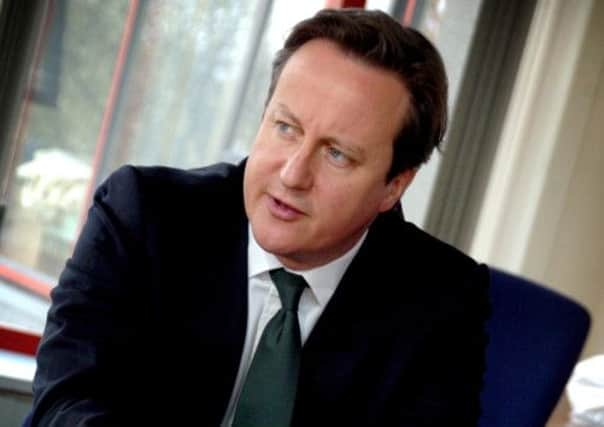Grant Woodward: As his rivals stumble, Cameron shines in spotlight as Britain’s best candidate for leading man


And yet two years out from a General Election he has firmly established himself as the most credible leader the country has.
It’s why whispers this week that he was laying the groundwork for another coalition in 2015 seemed so hard to understand. There is a fine line between pragmatism and defeatism and making preparations for further power-sharing strayed too close to the latter for comfort.
Advertisement
Hide AdAdvertisement
Hide AdThankfully those rumours have been denied by Cameron – the cue for an audible sigh of relief from his party and, for that matter, the country as a whole. If the green shoots of economic revival are to be built on then we need the sort of strong, decisive leadership that coalition government simply does not lend itself to.
For all his wrong turns and odd choices, David Cameron has managed to transform himself into a figure of clout. An important marker post in that process came last September, with his apology over the scandalous cover-up that followed the Hillsborough tragedy after its full scale was finally exposed in the explosive report compiled by the Hillsborough Independent Panel.
Sorry often seems to be the hardest word for politicians and yet the strength and sincerity of his speech to the Commons that day was imbued with a statesmanlike quality that his rivals would struggle to aspire to. Meanwhile, much like the steady jockey who watches his fellow riders tumble around him on his way to the finish line, he has had the luxury of sitting back and watching others be the masters of their own downfall.
Labour is now paying the price for its inexplicable decision to pick the wrong brother, with a few bristling performances at Prime Minister’s Questions failing to mask the fact that Ed Miliband’s leadership exists in a policy vacuum. His refusal to distance himself from Ed Balls and the attendant association with economic failure has left him struggling for credibility.
Advertisement
Hide AdAdvertisement
Hide AdFurther good news for Cameron came courtesy of the UK Indpendence Party. Riding a wave of popularity in the spring and early summer that translated into an unprecedented number of seats in May’s local elections, Nigel Farage’s party was hailed as a genuine threat to traditional Tory seats in 2015.
Since then, however, Ukip has appeared desperate to shoot itself in both feet. Party treasurer Stuart Wheeler found himself embroiled in a sexism row after bizarrely claiming that women’s failure to beat men at chess, bridge and poker means they are not competitive enough to deserve places in the country’s boardrooms.
Yorkshire MEP Godfrey Bloom, meanwhile, seems to be on a one-man mission to offend as many people as possible. Having sparked controversy by claiming British foreign aid should not be sent to “Bongo Bongo Land”, he has been at it again this week – claiming that women are better at finding “mustard in the pantry” than driving cars and that feminism is a “passing fashion” created by “shrill, bored, middle-class women of a certain physical genre”.
While such prehistoric and deliberately provocative views will play well with the hardcore of Ukip’s support, they are unlikely to convince floating voters to turn their backs on the Tories.
Advertisement
Hide AdAdvertisement
Hide AdAnd then there is Nick Clegg. He may have done a reasonable job in difficult circumstances, but three years of playing the junior partner in a coalition government has left him stranded in political no man’s land.
His calls for constitutional change have gone down like a lead balloon with a public that quite rightly wants its government to deliver jobs and economic recovery rather than tinkering with the make-up of the House of Lords.
And while support among his party members may have rallied in recent months, many feel he is in an impossible situation where he can do no right. Others grumble that he is doing better as Deputy PM than he is as party leader.
Despite all this, the money is still, incredibly, on Ed Miliband as the most likely to be Prime Minister in 2015. The current odds imply a 36 per cent chance of outright victory for Labour, and 20 per cent for the Tories.
Advertisement
Hide AdAdvertisement
Hide AdHe may have had a good summer but there is clearly still work to be done by David Cameron as he seeks to build on this renewed Conservative momentum.
Yet while Labour may hold a seven-point lead in the latest polls – and it’s calculated that Cameron would need a poll lead of the same margin to secure a working majority of 22 – history shows that Tory governments have made a habit of securing double-digit turnarounds in two years.
In the spring of 1981, Margaret Thatcher was pretty close to where David Cameron is now, with polls giving Michael Foot a near seven-point lead. At the 1983 General Election, she duly returned to Downing Street with a majority of 144. Four years later, a tie in the polls became a 12-point lead for the Tories, while in 1992 a 22-point turnaround saw John Major keep Neil Kinnock at bay.
If Cameron and the Tory Party can stay the course then it would take a brave man to bet against a repeat of such a feat in two years’ time.
Perhaps those who remain unconvinced by his credentials as Prime Minister need to answer this question: who, at present and in these circumstances, could do a better job?